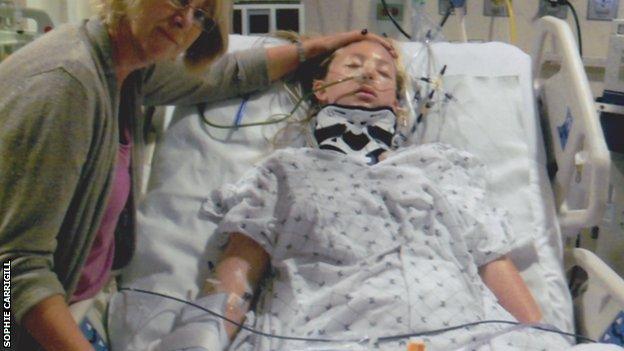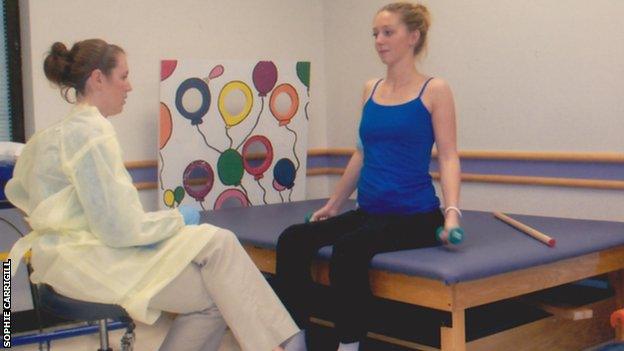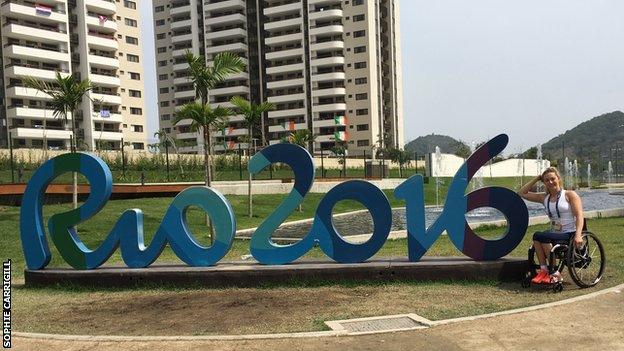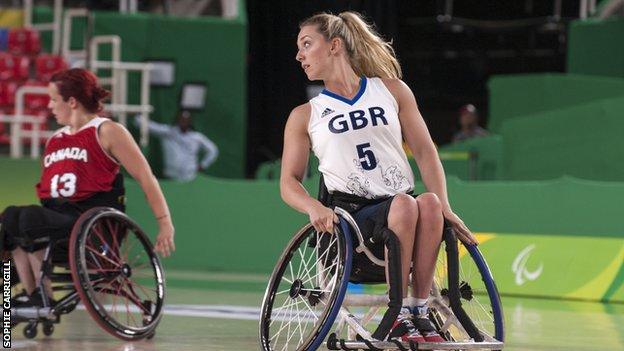GB wheelchair basketballer Sophie Carrigill on her Paralympic ambition in Tokyo
- Published
Sophie Carrigill - I knew I would never walk again
Ten years ago, teenager Sophie Carrigill was in a car accident while on holiday in the United States.
The confident, sport-loving 16-year-old from Wakefield broke her back and spinal cord and suffered serious internal injuries.
It left her paralysed from the waist down and facing a different future to the one she had imagined.
But she eventually returned to sport and is part of the Great Britain wheelchair basketball team. Here she talks candidly about the accident and the moment that changed her life.

Carrigill underwent considerable treatment in the US after the accident
I don't remember the accident itself, thankfully. I was told later the car was going too fast around a corner and the driver lost control and hit a tree.
I was sitting in the back in the middle but was wearing my seatbelt. If I hadn't been wearing it, I probably would have gone straight through the windscreen, but the seatbelt caused a lot of my injuries. I punctured both lungs, lost a lot of blood from my liver, lost part of my pancreas, my bowel and intestines were damaged and my spleen and gall bladder had to be removed.
Along with that, I also broke my back and my spinal cord and was put in an induced coma.
My parents got the first flight out to America, not knowing if I would be dead or alive when they arrived.
When I first woke up, nobody had to tell me I wasn't going to walk again - I just knew.

Rehab started in the US before continuing back in the UK
I must have been taking in a lot of information during my time in the coma - things my parents or the medical staff had been saying at my bed.
I remember saying to my mum "I know I'm not going to walk again". Because my internal injuries were causing me so much pain, breaking my back and the spinal cord seemed almost secondary.
I stayed in hospital in the US for two months and started my rehab there. Things like getting dressed and moving from my bed into the chair were challenging, but I look back on those moments and I am so much stronger.
After that, I went back home and to Pinderfields Hospital in Wakefield, where I also got the most amazing care.
I hadn't considered life with a disability and I didn't think about sport for a really long time.
I just thought it wouldn't be the same. I wouldn't get the same adrenaline rush, feel sweaty, get a stitch or feel like I had worked hard.
Eventually, I started to feel more like my old self and I signed up to a course run by the Backup Trust, who do amazing things for people who suffer spinal cord injuries and it changed my life for the better.
We did abseiling, canoeing and horse riding - things I didn't think were possible and it made me feel competitive again.
After that, I started to play wheelchair basketball in Leeds. I was terrible at the start but I never let anything get the better of me and I kept working hard. The hard work paid off.
I was part of the Paralympic Inspiration programme at London 2012 and after watching the GB women lose in the quarter-finals, I knew I wanted to be at the next Games in Rio so I made every decision after that based on basketball to give myself the best possible chance.

Carrigill made her Paralympic debut in 2016, when she was co-captain of the GB team
I made my GB debut at the 2013 Europeans and by 2015 we finished fifth at the World Championships, our best-ever finish.
At the start of 2016, I suffered a ruptured bowel and needed an operation which put my Paralympic place in doubt. The thought that the last four years could be taken away from me was devastating.
I did everything I could to be in the best shape possible to be selected. When I made it, it was such a relief and made my Rio experience special because I thought I might not make it.
Out of my bedroom window in the Paralympic Village, I could see the Park and that feeling was so special. As a child, sport had been a big part of my life and now to be representing my country on the biggest stage was magical.
We reached the semi-finals for the first time but lost to the US, who went on to win gold, and were then beaten in the bronze medal match by the Netherlands. It was then full steam ahead for Tokyo before the Games were postponed until next year.
I don't want to come fourth again and it is definitely why I train and persevere now.
It's now 10 years since the accident and I've come out the other side much stronger, more powerful and more determined.

Carrigill is now working towards the rescheduled Tokyo Paralympics
I believe in how strong I am, and that's something I might not have felt if I hadn't had the accident.
I can look adversity in the eye and say 'Come at me because I can deal with you'.
I also really appreciate the small things in life - a nice summer's day, time with friends and family, because those things could have been taken away from me.
I'll be celebrating the anniversary with those who have supported me throughout all this. Without them I wouldn't be where I am today or have the same drive and determination.
It is time to celebrate because I was very close to not making it and I'm honoured to still be alive.
(As told to Elizabeth Hudson)

From gamer to professional racer: How did simulation lead to the track?
The UK's most unusual festivals: From Cheese Rolling to Gravy Wrestling Championships
